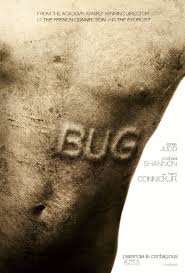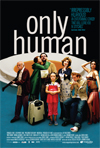TSOTSI

HUGE THUMBS UP FOREIGN FILM REVIEW RATING!
Many movie reviewers view foreign language films with a smidgin of contempt. There’s an underlying current of the "why do we have to put up with these things" type mentality, especially from U.S. reviewers. It’s not entirely self-evident when reading these reviews, but you get that feeling deep down that American film makers, producers, marketers, and reviewers swallow these foreign film pills with a hint of displeasure. I’m sure much of that discomfort comes from the fact that some of these films drain a certain percentage of money out of their deep pockets. Personally, I say "More power to ‘em!"
The reason I bring this up is because TSOTSI is one of those films that could’ve taken off in the American mainstream had it had a significant marketing budget. It did, after all, win multiple film festival awards, snagged the American Film Institutes Audience Award and Grand Jury Prize Special Mention, as well as picking up an Academy Award for Best Foreign Language Film. But because of the mentality of movie makers in the fabulously wealthy Hollywood arena, marketing of these vitally important foreign imports often gets hamstrung in favor of such film dregs as DATE MOVIE and THE 40 YEAR OLD VIRGIN. I don’t say these things without any source. Go up and ask your average young adult or teenager about TSOTSI and they’ll more often than not simply stare at you as if you’d just requested they give you the mathematical equation for nuclear fission.
There’s something to be said for these low-budget films (although I’m not sure what TSOTSI’s shooting costs were, I feel confident it didn’t come close to the two dregs I mentioned above). These little-known gems give us stories that go beyond our normal film viewing range. And TSOTSI is one that I’m proud to say I watched with joy (this is a also disturbing and I’ll tell you why in a moment).
Tsotsi (Presley Chweneyagae) is a "thug" in Johannesburg, South Africa. He’s your typical amoral gangster who doesn’t have a shred of "decency" in his young body. He also has a group of stragglers who follow him around like puppies, putting pressure on Tsotsi to come up with their evening’s entertainment; they steal, they rob, they kill. But one day, when Tsotsi decides to do a job by himself, he makes a moral mistake (and I mean he makes a mistake according to his own moral code, which is to say he causes something good to come out of something terrible). He shoots a woman after stealing her car and drives away with a new BMW. But as he travels awkwardly down the road (he doesn’t drive very well) he hears a cooing sound in the backseat. Startled, he turns around and discovers a baby in a carseat. Initially unsure of what to do, he takes the baby home with him and nurtures the child as best he can (which isn’t very good). He soon learns that he has to watch the baby closely; ants attack the infant, and it gets hungry and poops constantly and needs to be bathed. Tsotsi forcibly procures the assistance of a widowed neighbor who recently had a child. He convinces the woman -- at gunpoint -- to breast feed the child and threatens to kill her if she tells anyone about him and the baby. A strange relationship develops between these two as the film progresses.
Torn by his own poor upbringing, Tsotsi has to decide what to do with the child when he learns that its mother is still alive. The police, too, are closing in on him and his gang of thugs have disbanded. Tsotsi’s choice to care for the child has put him on a path of physical destruction, but has also led him to deeper choices, those of compassion and morality.
In the end, Tsotsi battles his internal demons in order to make the right choice for the baby, and it’s a startling realization. We watch a person we absolutely loathed in the beginning of the film turn ever so slightly into a "decent" young man, and it’s disturbing as a viewer (for me, at least) to empathize with someone initially devoid of humanity. But that’s where TSOTSI succeeds and so many American films fail. American movies want you to see most things in black and white ("Here’s the good guy and here’s the bad"). But TSOTSI brings us into these lives and does so without spoonfeeding us what’s right and what’s wrong. The gray areas are sweeping and uncomfortable, something that packs an emotional wallop at the end of the film (I was bubbling like an idiot as tears streamed down my cheeks).
TSOTSI deserves the little notoriety it’s received. In fact, it deserves much, much more.
Click here for the Tsotsi movie trailer!
Oscar Award Winner: Best Foreign Language Film (South Africa)
Golden Globe Award Nominee: Best Foreign Language Film (South Africa)
BAFTA Award Nominee: Best Film Not in the English Language















1 Comments:
Quite informative…Thanks for sharing nice post..
regards
GIS data processing
georeferencing services
Post a Comment
<< Home